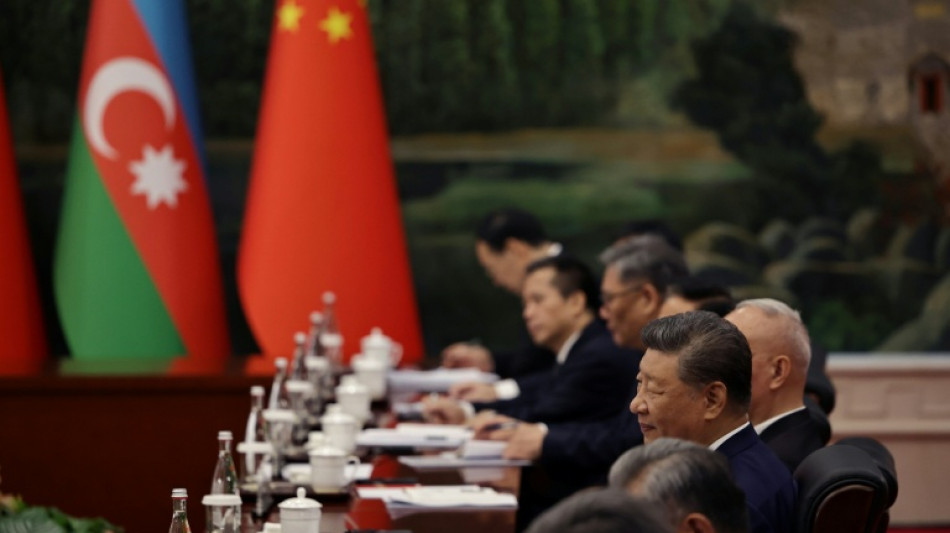President Xi Jinping gathered the leaders of Russia and India among dignitaries from around 20 Eurasian countries on Sunday for a showpiece summit aimed at putting China front and centre of regional relations.
Security was tight in the northern port city of Tianjin, where the Shanghai Cooperation Organisation summit is being held until Monday, days before a massive military parade in the capital Beijing to mark 80 years since the end of World War II.
The SCO comprises China, India, Russia, Pakistan, Iran, Kazakhstan, Kyrgyzstan, Tajikistan, Uzbekistan and Belarus -- with 16 more countries affiliated as observers or "dialogue partners".
Russian President Vladimir Putin touched down in Tianjin on Sunday with an entourage of senior politicians and business representatives.
Meanwhile Xi held a flurry of bilateral meetings with leaders from the Maldives, Azerbaijan, Kyrgyzstan and one of Putin's staunch allies, Belarusian President Alexander Lukashenko.
He also met India's Prime Minister Narendra Modi, Xinhua news agency reported.
- 'Project influence' -
China and Russia have sometimes touted the SCO as an alternative to the NATO military alliance. This year's summit is the first since US President Donald Trump returned to the White House.
In an interview published by Xinhua on Saturday, Putin said the summit will "strengthen the SCO's capacity to respond to contemporary challenges and threats, and consolidate solidarity across the shared Eurasian space".
"All this will help shape a fairer multipolar world order," Putin said.
As China's claim over Taiwan and Russia's invasion of Ukraine have seen them clash with the United States and Europe, experts say that Beijing and Moscow are eager to use platforms such as the SCO to curry favour.
"China has long sought to present the SCO as a non-Western-led power bloc that promotes a new type of international relations, which, it claims, is more democratic," said Dylan Loh, an assistant professor at Singapore's Nanyang Technological University.
More than 20 leaders including Iranian President Masoud Pezeshkian and his Turkish counterpart Recep Tayyip Erdogan are attending the bloc's largest meeting since its founding in 2001.
"The large-scale participation indicates China's growing influence and the SCO's appeal as a platform for non-Western countries," Loh added.
Beijing, through the SCO, will try to "project influence and signal that Eurasia has its own institutions and rules of the game", said Lizzi Lee from the Asia Society Policy Institute.
"It is framed as something different, built around sovereignty, non-interference, and multipolarity, which the Chinese tout as a model," Lee told AFP.
- Talks on the sidelines -
Xi met leaders including Cambodian Prime Minister Hun Manet in Tianjin on Saturday.
Putin is expected to hold talks on Monday with Turkey's Erdogan and Iran's Pezeshkian about the Ukraine conflict and Tehran's nuclear programme respectively.
The Russian president needs "all the benefits of SCO as a player on the world stage and also the support of the second largest economy in the world", said Lim Tai Wei, a professor and East Asia expert at Japan's Soka University.
"Russia is also keen to win over India, and India's trade frictions with the United States presents this opportunity," Lim told AFP.
The summit comes days after India was hit by a sharp bump up in US tariffs on its goods as punishment for New Delhi's purchases of Russian oil.
India's premier Modi arrived on Saturday, in his first visit to China since 2018.
The two most populous nations are intense rivals competing for influence across South Asia and fought a deadly border clash in 2020.
A thaw began last October, when Modi met with Xi for the first time in five years at a summit in Russia.
Modi was not on a list of attendees for the Beijing parade published by Chinese state media that included Myanmar's junta chief Min Aung Hlaing and North Korea's leader Kim Jong Un.
L.Moonen--LCdB
